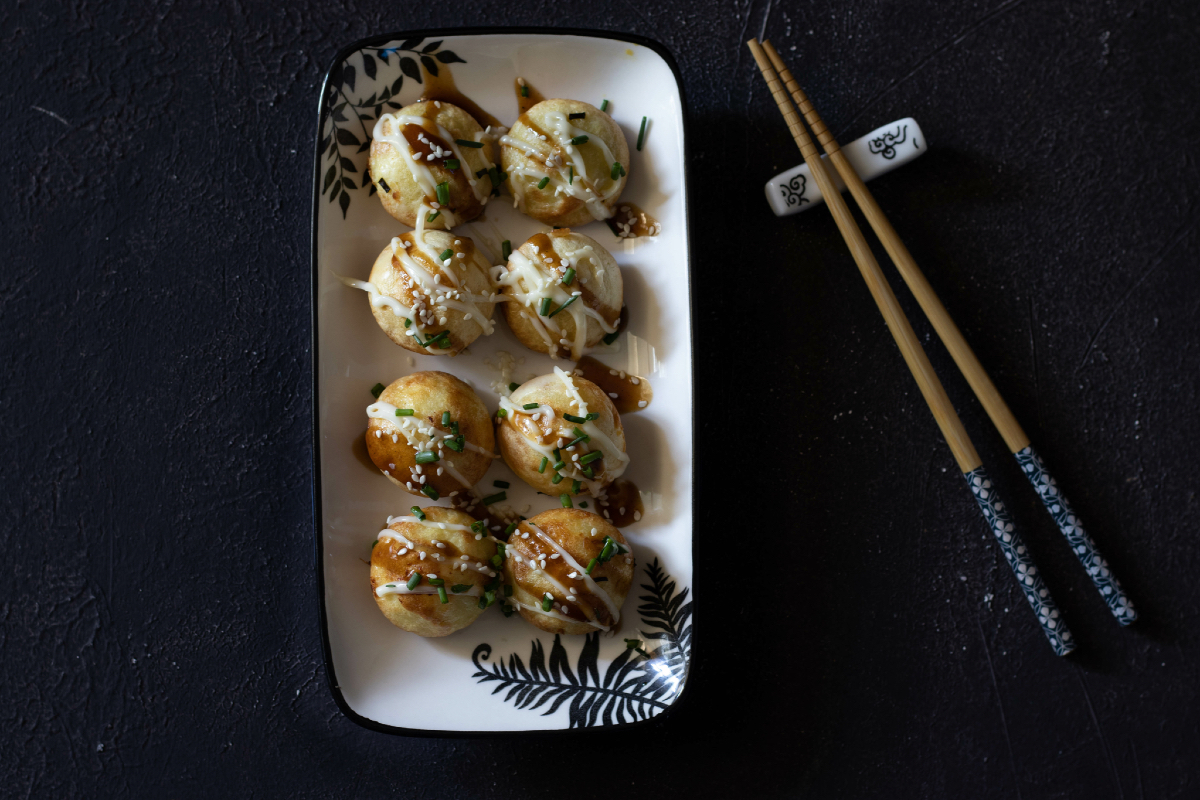Octopus Meatballs
- Easy
- 3 h 10 min

Takoyaki, this super-popular Japanese street food, comes straight from the vibrant city of Osaka. Seriously, these famous Japanese octopus balls are a must-try if you're ever at a festival. They are known for their unique texture and really, really good flavor. Imagine biting into a ball that's crispy on the outside and creamy on the inside. It's a flavor burst every time. The secret? It's all in the dashi-based batter, with chewy octopus, pickled ginger, and green onions—each bite's an adventure. Vendors whip them up fresh on a takoyaki pan right in front of you, and the sight alone is as great as the taste. They top it with a zigzag of takoyaki sauce, Japanese mayo, and katsuobushi flakes—those even dance with the heat. So fun and delicious.
Here's the deal with homemade takoyaki: it's all about that balance of textures and flavors. Tender octopus, a golden, crispy shell, plus a tangy kick from the toppings—it's unbeatable, really. In Osaka, street vendors often toss in tempura scraps for extra crunch. I mean, talk about versatility. Trying an easy takoyaki recipe at home lets you play with the dashi batter and your own fillings—so it feels like traditional Japanese cooking right there in your kitchen. Honestly, no wonder takoyaki is a matsuri favorite. The flavor combo? Unmatched, and the experience itself? It feels like a celebration. So whether you're craving that authentic Osaka street vibe or just want something new and super tasty, these little balls deliver. It's a snack full of flavor. For sure. Worth making again and again. With takoyaki, every bite feels like a festival—inviting you into Japan's rich culinary traditions.
You might also like:

To prepare the takoyaki, start by cooking the octopus: fill a pot with plenty of water, then add a pinch of salt 1, a bunch of parsley 2, and the onion 3.

Add the celery 4 and bring to a boil 5. Once the water starts boiling, immerse the octopus and cook it for about 40 minutes 6.

After the octopus is cooked, drain it and remove the beak at the center of the tentacles, if still present 7. Then cut the flesh into pieces 8. Transfer the octopus to a bowl and set aside 10.

Prepare the dashi broth: pour the water into a glass jar 10, then add the kombu seaweed 11 and the katsuobushi 12.

Close the jar 13 and let it steep at room temperature for at least a couple of hours (or even overnight) 14. After the steeping time, transfer the dashi to a small pot 15.

Simmer for a few minutes 16; it should only warm slightly to enhance the flavors. Turn off the heat and strain the obtained broth 17. Weigh 250 g of dashi for the batter preparation and let it cool 18.

Now finely chop the chives 19 and the ginger 20. Finally, prepare the batter: in a large bowl, pour the egg and the flour 21.

Mix well with a whisk 22, then gradually add the 250 g of dashi while continuing to stir with the whisk 23. Once you have a smooth and homogeneous batter, adjust with salt 34.

You are ready for cooking: brush the takoyaki plate with a little vegetable oil 25, then place it on the stove with a flame diffuser and heat it well. Using a pitcher with a spout or a ladle, fill the molds with the prepared batter 26. Immediately insert the pieces of octopus 27, chives 35, and ginger 36 into each mold.

Also distribute the chopped chives and ginger 28. Cook the takoyaki for about 7-8 minutes over high heat, then turn them with the help of a toothpick 29 and cook them for the same time on the other side. If necessary, turn them occasionally until fully golden 30.

Transfer the cooked takoyaki to a plate and garnish with mayonnaise and okonomiyaki sauce 31. Finish with white and black sesame seeds 32 and a bit of chives. Your takoyaki are ready to be enjoyed 33!